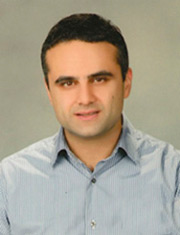Young Scholar Profile: Ömer Yılmaz
In every issue of The Bridge, we highlight a young scholar profile from our diaspora. These accomplished and early career individuals demonstrate the potential of next generation Turkish-American scientists and scholars. The young scholar in this issue is Omer Yilmaz, MD., Ph.D. who is an assistant professor of biology at Massachusetts Institute of Technology and Harvard Medical School.
 The Bridge: Would you please tell us about yourself and your journey that led you to become a scientist.
The Bridge: Would you please tell us about yourself and your journey that led you to become a scientist.
Ömer Yılmaz: I am a first generation Turk that grew up in Battle Creek, Michigan. My parents encouraged me to follow my dream of being a physician scientist. As a kid and teenager, I spent nearly most of my free time with my father, who was a physician. I literally felt like a kid in a candy shop while making hospital rounds with my dad: This experience exposed me to myriad diseases that I knew so little about. This motivated me to read and discuss different disease entities with my father that laid the foundation for my long-standing interest in the mechanisms and pathologies of human diseases. Upon graduation from high school, I attended the Inteflex program at the University of Michigan (a combined BS/MD program), where I majored in Biochemistry and Physics. In medical school, I pursued my passion for understanding disease mechanism by obtaining a combined MD-PhD with my PhD in cellular and molecular biology. For my PhD I studied how blood-forming stem cells in the bone marrow give rise to blood cancers (or leukemia) in the laboratory of stem cell pioneer Sean Morrison.
After graduating from the MD-PhD program in 2008, I completed a residency in anatomic pathology with fellowship training in gastrointestinal pathology at the Massachusetts General Hospital of Harvard Medical School. While in residency, I continued to pursue post-doctoral research in the laboratory of David Sabatini at the Whitehead Institute for Biomedical Research of MIT. A fundamental question that I have been interested is to understand how tissue regeneration and cancer initiation are modulated by organismal diet and physiology. My model system for addressing this question is the mammalian intestine, which fits nicely with my clinical background in gastrointestinal pathology.
I recently accepted a faculty position as an Assistant Professor in the David H. Koch Institute for Integrative Cancer Research at MIT and will continue as a Pathologist at the Massachusetts General Hospital of Harvard Medical School
T. B. : Tell us about your research and how it is related to everyday life or other fields.
Ö. Y. : My lab is working on elucidating the molecular mechanisms underpinning this connection between stem cells, diet, and cancer in conditions of low calorie diets as well as in high fat diet-induced obesity in intestine. By better understanding how intestinal stem cells adapt to diverse diets, his lab hopes to identify and develop new strategies that prevent and reduce the growth of cancers involving the intestinal tract that includes the small intestine, colon, and rectum.
T. B. : What do you consider important to your success ? Tell us about any skills or habits that you think helped you to become a successful scientist at such a young age.
Ö. Y. : Ambition, persistence and hard work
T. B. : What are your immediate and long-term goals for the future?
Ö. Y. : My immediate and long-term goal is to foster a collaborative, diverse environment in my new lab that will lead to new discoveries and treatments for cancer patients but also to train the next generation of scientists.
T. B. : What do you recommend to aspiring scientists , or to young Turkish scientists who are at the beginning of their careers?
Ö. Y. : My advice to aspiring scientists and current trainees is to find a biological question that interests one so deeply that you cannot wait to get to lab in the morning to delve deeper into it. Of course, finding a supportive mentor and good work environment are tantamount but never forget the importance of finding an exciting question to address. A good question motivates one and neutralizes the uncertainty inherent to basic research.
T. B. : Could you please tell us about your life outside of your work? Do you have hobbies? What are your favorite activities? If you recommend a book, what would that be and why?
Ö. Y. : Outside of work my biggest hobby is to spend time with my wife Berfin and 18 months old son Zihni and to travel to Turkey. I usually enjoy reading well-written articles in the New Yorker magazine that add perspective on current events.
T. B. : Thank you very much.